Atlantis - The Lost City Legend

There are certain things and ideas in this world that always intrigue people. The charm of the unknown is unbelievably strong, everyone knows that. One of those ideas that attract us is the idea of lost, ancient or alien civilizations. The legend of Atlantis definitely combines those three. But what does this have to do with Santorini? Well, here's a quote from the introduction:
See, Santorini's volcano is involved in one of the versions about Atlantis' existence and destruction. So on that note, we're going to explore this myth/legend.
"The Minoan Eruption": this total catastrophe, taken together with the collapse of the volcano in the eruption, gave rise to the legend of Lost Atlantis
The Origins of the Myth
The story of the lost continent of Atlantis begins in 355 BC, with the Greek philosopher Plato. Plato, who used dialogues (arguments and debates) between characters (real or not) to express his views, had planned to write a trilogy of books that would discuss the nature of man, the creation of the world and the story of Atlantis, among other things. This trilogy was never completed, but part of it has survived.
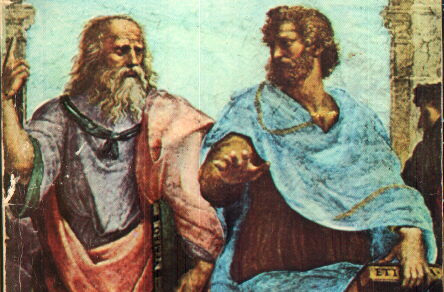
In his book called "Timaeus", a character named Kritias mentions Atlantis, a powerful empire that was located to the west of the "Pillars of Hercules" (the Straight of Gibraltar, as we call it now) on an island in the Atlantic ocean. This empire was a marvel of architecture that housed a brilliant civilization. The capital city was composed of a series of concentric walls and canals and at the center there was a hill where you could find a temple to Poseidon with a gold statue of the God inside, showing him driving six winged horses.
But 9000 years before the time of Plato, the gods decided to destroy the people of Atlantis who had become corrupted and greedy. So,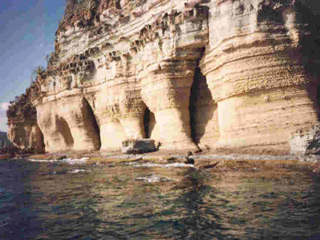 a violent earthquake shook the land, giant waves rolled over the shores and the island sank into the sea, never to be seen again.
a violent earthquake shook the land, giant waves rolled over the shores and the island sank into the sea, never to be seen again.
Now, one might argue that this is nothing but a fairytale, a disturbingly beautiful story that Plato came up with to prove his point. But Plato's characters refer to the story of Atlantis as "genuine history" and it being "within the realm of fact". Plus, Plato seems to get too detailed for a place that doesn't exist. The only thing that might have proven this tale fake or based on true events is the writings of Aristotle, Plato's student, who historian Strabo quotes saying that Atlantis was simply created by Plato to make a point. But alas, those writings were lost eons ago.
Atlantis' Location
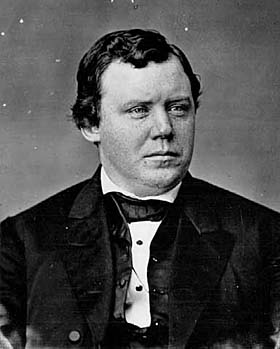
If we assume that Atlantis was indeed a real place, it seems only logical that we would find it west of the Straight of Gibraltar, as Plato himself stated. 1882, a man named Ignatius Donnelly, who was an American politician, came to the belief that Plato's story represented lization itself began with the Atlantians and spread out throughout the world through their established colonies in places like ancient Egypt.
Donnelly's theories were never backed up by proof. In fact, as time went on it became more and more obvious that those theories were faulty. After Donnelly, people made cases for places like Switzerland, New Zealand and Brazil. But the most convincing argument came from K.T. Frost, a professor of history.
Frost suggested that Atlantis was east of the Pillars of Hercules, not west. He also suggested that the catastrophe that brought the island to its end had taken place 900 years before Plato's time, not 9000. If this was true, the land of Atlantis might already be a well-known place, even in Plato's time: the island of Crete.
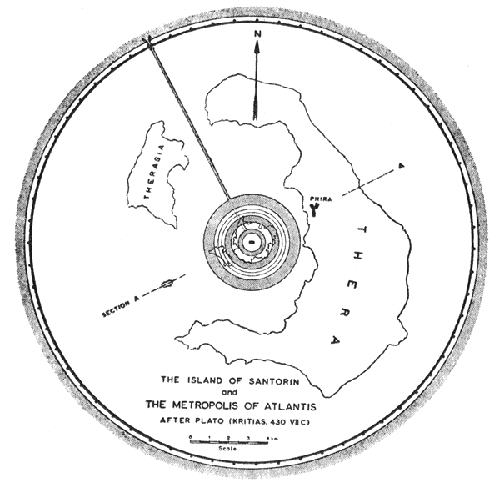
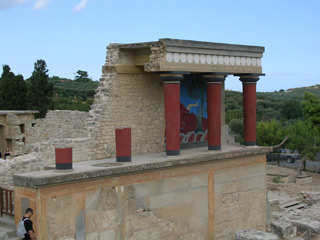
That's where Santorini comes to the picture. See, Crete, which is now a major part of Modern Greece lying just south of Athens, was the seat of the magnificent Minoan Empire; you surely have heard of it. It's one of most sophisticated cultures of its time, as archaeological excavations have proven. But one day it just disappeared, out of the blue.
"The Minoan Eruption": this total catastrophe, taken together with the collapse of the volcano in the eruption, gave rise to the legend of Lost Atlantis.
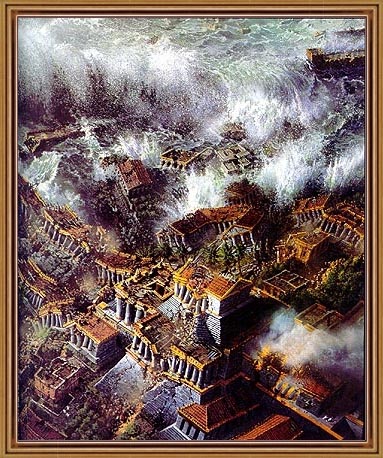
So, that's what happened: the volcano of Santorini blew itself apart in a massive explosion around 1500 BC. That explosion was so powerful that a tsunami was created, a tsunami that traveled all the way to Crete, ten miles away, and destroyed any coastal towns and cities. That day was when the Minoan civilization ceased to exist.
Why do people think that the Minoans were in fact the Atlantians? It's our best guess, really. The similarities between those two civilizations (as Plato described the Atlantians, anyway) are striking: women with high political status, peaceful cultures, ritualistic bullfighting sports. Plus, it's easy to assume that Plato got the location wrong or, even more probable, that his texts were misinterpreted: a zero was added (which turned 900 to 9000) and the word "east" was translated wrongly as "west".
So, that's Santorini's connection with Atlantis. It might be true, it might not be. Atlantis might not be even a true story. But even if it isn't, it sure is an interesting myth or legend that adds a touch of mystery to this volcano and the island, as well as the country it belongs to.





